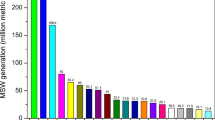Abstract
Generally, plastics pose a variety of environmental impacts due to their increased use and non-biodegradability. End-of-life treatment is a viable way of recovering energy from plastics while at the same time reducing the amount of plastics disposed of in landfills. This paper studies the environmental impact of Non-Recycled Plastics (NRP)-to-energy processes. Three waste treatment processes were considered for NRP: pyrolysis, waste-to-energy (WtE), and landfill. The environmental impact assessment results indicated that conversion technologies such as pyrolysis and WtE are preferred over landfill. The total energy consumed in the pyrolysis process was 24635.7 MJ/tonne. The conversion technologies have a lower environmental impact and produced net positive energy from NRP. The global warming potential shows that pyrolysis (3.91 kg eq. CO2) contributes the least to global warming than waste-to-energy (18.56 kg eq. CO2) and landfill (17.5 kg eq. CO2). However, sensitivity analysis suggested that the inefficiencies of the current conversion technologies should be addressed. Between the two technologies studied, pyrolysis contributed less environmental burden, having a lower global warming potential, a higher efficiency in energy conversion, and less harmful emissions such as selenium and methane.











Similar content being viewed by others
Change history
27 August 2021
A Correction to this paper has been published: https://doi.org/10.1007/s42768-021-00078-9
References
Mastellone, M.L. 2019. A feasibility assessment of an integrated plastic waste system adopting mechanical and thermochemical conversion processes. Resources, Conservation & Recycling: X 4: 100–117.
Rodriguez, L. Valdiviezo, T. Harden, et al. 2019. Transforming non-recyclable plastics to fuel oil using thermal pyrolysis. http://ccnyeec.org/wp-content/uploads/2013/12/GroupH_FINALREPORT.pdf. Accessed 29 Oct 2020
Miandad, R., Rehan, M., Barakat, M.A., et al. 2019. Catalytic pyrolysis of plastic waste: moving toward pyrolysis based bio-refineries. Frontiers in Energy Research 7: 27.
Ritchie, H., Faqs on plastics, 2018. https://ourworldindata.org/faq-on-plastics.
United States Environmental Protection Agency, Municipal solid waste generation, recycling, and disposal in the united states: Facts and figures for 2008., http://www.epa.gov/waste/nonhaz/municipal/pubs/msw2008rpt.pdf.
United States Environmental Protection Agency, Facts and figures about materials, waste and recycling, 2019. https://www.epa.gov/facts-and-figures-about-materials-waste-andrecycling/plastics-material-specific-data
Benavides, P.T., Sun, P., Han J., et al. 2017. Life-cycle analysis of fuels from post-use non-recycled plastics. Fuel 203: 11–22.
Guerrero, L.A., Maas, G., Hogland, W. 2013. Solid waste management challenges for cities in developing countries. Waste management 33 (1): 220–232.
B. Bauman, How plastics contribute to climate change, 2019. https://yaleclimateconnections.org/2019/08/how-plastics-contribute-to-climate-change/.
Research Triangle Institute, Environmental and economic analysis of emerging plastics conversion technologies, 2012.
Eriksson, O., Finnveden, G. 2009. Plastic waste as a fuel-co2-neutral or not? Energy & Environmental Science 2 (9): 907–914.
Verma R., Vinoda, K. S., Papireddy, M., Gowda, A. N. S. 2016. Toxic pollutants from plastic waste-A review. International Conference on Solid Waste Management, 5IconSWM 2015. Procedia Environ. Sci, vol. 35, pp. 701– 708, 2016. Available at: https://doi.org/10.1016/j.proenv.2016.07.069
Chen, D., Yin, L., Wang, H., et al. 2014. Pyrolysis technologies for municipal solid waste: a review. Waste Management 34 (12): 2466–2486.
Lombardi, L., Carnevale, E., Corti, A. 2015. A review of technologies and performances of thermal treatment systems for energy recovery from waste. Waste Management 37: 26–44.
Mukherjee, B.D., Ghosh, S.K. 2016. A review on technologies of removal of dioxins and furans from incinerator flue gas, Procedia environmental sciences, vol. 35, pp. 528–540.
Barabad, M.L.M., Jung, W., Versoza, M.E., et al. 2018. Characteristics of particulate matter and volatile organic compound emissions from the combustion of waste vinyl. International Journal of Environmental Research and Public Health 15 (7): 1390.
United States Environmental Protection Agency, Basic information about landfill gas, 2019. https://www.epa.gov/lmop/basic-information-about-landfill-gas#%3A~%3Atext%3DMunicipal%20solid%20waste%20(MSW)%20landfills%2Cof%20these%20emissions%20in%202018
Jaunich, M.K., Levis, J.W., DeCarolis, J.F., et al. 2019. Solid waste management policy implications on waste process choices and system wide cost and greenhouse gas performance. Environmental Science & Technology 53 (4): 1766–1775.
Hetherington, C., Borrion, A.L., Griffiths, O.G., et al. 2014. Use of LCA as a development tool within early research: challenges and issues across different sectors. The International Journal of Life Cycle Assessment 19 (1): 130–143.
Wernet, G., Bauer, C., Steubing, B., et al. 2016. The ecoinvent database version 3 (part i): Overview and methodology. The International Journal of Life Cycle Assessment 21 (9): 1218–1230.
Gear, M., Sadhukhan, J., Thorpe, R., et al. 2018. A life cycle assessment data analysis toolkit for the design of novel processes–a case study for a thermal cracking process for mixed plastic waste. Journal of Cleaner Production 180: 735–747.
Hanes, R.J., Bakshi, B.R.. 2015. Sustainable process design by the process to planet framework. AIChE Journal 61 (10): 3320–3331.
E. International Organization for Standardization, 14040: 2006. environ. manag. cycle assessment and principles fram. European Committee for Standardization, 2006.
Shonfield, P. 2008. LCA of management options for mixed waste plastics. UK: WRAP.
Jeswani, A.H., Azapagic, A. 2016. Assessing the environmental sustainability of energy recovery from municipal solid waste in the uk. Waste Management 50: 346–363.
McDougall F.R. , White, P.R., Franke, M., et al. 2008. Integrated solid waste management: a life cycle inventory. Wiley, United States
Tsiamis, D.A., Castaldi, M.J. 2016. Determining Accurate Heating Values of Non-Recycled Plastics (NRP). Earth Engineering Center City College City University of New York, United States. March 23.
Author information
Authors and Affiliations
Corresponding author
Additional information
Publisher's Note
Springer Nature remains neutral with regard to jurisdictional claims in published maps and institutional affiliations.
Rights and permissions
About this article
Cite this article
Zhang, H., Themelis, N.J. & Bourtsalas, A. Environmental impact assessment of emissions from non-recycled plastic-to-energy processes. Waste Dispos. Sustain. Energy 3, 1–11 (2021). https://doi.org/10.1007/s42768-020-00063-8
Received:
Revised:
Accepted:
Published:
Issue Date:
DOI: https://doi.org/10.1007/s42768-020-00063-8




